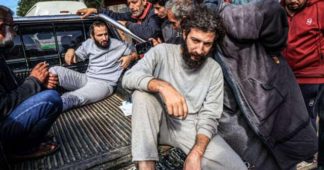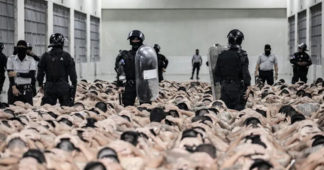Hakan Özal
Jun 2, 2025
A number of prisoners in Turkey have initiated an indefinite hunger strike to protest the severe isolation prevalent in S-, Y-, and R-type high-security prisons, which are among those referred to as “well-type” facilities throughout the country. (”Prisons have turned into a well, we are all at the bottom of this well,” one commentator explained.)
In these approximately 40 brutal institutions, prisoners are subjected to a state of profound sensory and social deprivation. This deprivation encompasses the fundamental human needs for visual contact with the sky, auditory exposure to human voices and tactile interaction with other individuals. Prisoners on hunger strike are demanding an end to this system of isolation, closure of such prisons, release of sick prisoners and an end to forced transfers.
The Sosyalist Eşitlik Grubu (Socialist Equality Group) in Turkey advocates the fundamental right of all individuals detained to be held in conditions consistent with the principles of human dignity and health. The “well-type” prisons, where solitary confinement has been transformed into a systematic form of torture, must be closed and the release of political prisoners must be carried out immediately.
Prisoners on hunger strike have stated in their petitions, letters and interviews with legal counsel that they are experiencing not only physical, but also mental and emotional distress.
In a recent press conference held by the Contemporary Lawyers Association (ÇHD) at the Istanbul Bar Association Cultural Center, the testimony of prisoners detained in these torture prisons was made public.
According to the b ianet, Onur Yoldaş Mete, a member of the Federation of Socialist Youth Associations (SGDF), described his experience in Çorlu Karatepe Prison as follows:
The average prisoner spends 23 hours a day in a single, dark cell. The dissemination of information, including the exchange of newspapers, is strictly prohibited. In such circumstances, it is anticipated that prisoners will experience a diminution of their capacity to communicate and regulate their anger.
Vedat Doğan, a member of the Grup Yorum music band, delivered a presentation on the systematic violations he faced during his 178-day hunger strike.
We were denied access to water, and the lemons provided were rotten. Furthermore, the B vitamins administered were in deficient doses. The lingering effects of the hunger strike remain vivid in my recollection. They finally accepted our referral request, but only after we nearly died.
Meanwhile, Grup Yorum, a well-established left-wing band with millions of listeners, was censored on YouTube and Spotify last week at the government’s request, on the pretext of “protecting national security and public order.”
Lawyer Seda Şaraldı characterized these prisons as “structures that destroy the sociability of human beings.” She stated that the cells are built without windows, ventilation or light, and prisoners are only allowed to see the sky for one hour. She added that, in addition to violating the right to privacy with cameras, the most basic social rights, such as chatting and visiting, are also eliminated.
According to Şaraldı, at least nine prisoners are on an indefinite and irreversible hunger strike to protest these conditions. Those on strike include Sercan Ahmet Arslan (219 days), Serkan Onur Yılmaz (197 days), Bakican Işık (158 days), Mithat Öztürk (102 days), Fikret Akar (57 days) and Grup Yorum members Ali Aracı, Ali Hasan Akgül, Ufuk Keskin (97 days) and Yurdagül Gümüş (144 days). The prisoners face serious health problems, including severe weight loss, chronic pain, neurological issues and loss of mobility.
Following the NATO-backed military coup in 1980, prison policies underwent a radical change in Turkey. During this period, to prevent collective resistance and solidarity among political prisoners, the traditional large ward system was replaced with a new architecture based on rooms and cells. First, E-type prisons were built, and large wards were transformed into units for 16–20 people. Then H-type prisons were built with smaller cells for four to six people. These structures’ main purpose was to limit prisoners’ social relations and isolate them physically and psychologically to keep them under pressure. This new prison architecture was expanded in the following years to enable more advanced isolation practices.
These policies reached their peak in 2000 with the implementation of F-type prisons. Consisting of one- and three-person cells, these structures operated under a vicious regime that condemned prisoners to almost total solitude.
The collective resistance of political prisoners to this isolation was met with violent attacks by the state. On December 19, 2000, under the leadership of Prime Minister Bülent Ecevit of the social democratic Democratic Left Party (DSP), simultaneous raids were carried out in 20 prisons as part of “Operation Return to Life.” During the operation, 30 women and men prisoners were killed and hundreds were subjected to severe torture.
This model of isolation, initiated with F-type prisons, continued under the Justice and Development Party (AKP) government led by current president Recep Tayyip Erdoğan. In recent years, even more aggravated versions, the S- and Y-type high-security prisons, have been implemented.
According to the Human Rights Association’s (İHD) 2025 “High Security Prisons and Type S Prisons Report,” prisoners are permitted only one hour outside per day, and this time is frequently restricted for arbitrary reasons. The same report explains that greeting a prisoner in the next cell is considered a “disciplinary offense” and punished. This situation demonstrates an isolation strategy that aims to break down prisoners both physically and psychologically.
Severe isolation conditions are accompanied by the obstruction of the right to health. The same report reveals that prisoners must petition for days just to be allowed to go to the infirmary, and these requests are often ignored. Taking prisoners to the hospital with their hands and feet shackled is not only against medical ethics, but also against human dignity. This kind of treatment endangers the physical survival of prisoners.
The report also points out that prisoners are cut off from the outside world. They are prevented from taking books, magazines and letters without justification, and incoming publications are confiscated. Disciplinary committees restrict prisoners’ rights to open visits and phone calls with subjective evaluations such as “not showing remorse” and isolate them socially.
These conditions of aggravated isolation profoundly impact the mental and physical well-being of prisoners, sometimes leading to irreversible consequences. The same report states that prisoners kept in solitary confinement for long periods suffered severe psychological breakdowns and some have been driven to suicide. When deprived of basic sensory needs, such as talking to people, touching or hearing a voice, individuals gradually lose their emotional and mental capacity as humans.
Another factor that exacerbates the effects of isolation on prisoners is the architectural design of S- and Y-type prisons. According to the Civil Society in the Penal System (CISST) assessment,
S- and Y-type prisons are more isolated structures, and the conditions of isolation are more severe compared to F-type prisons. While F-type prisons have both wards and cells, S- and Y-type prisons only have cells.
This physical structure not only permanently isolates prisoners at the structural level, but also severely limits their daily movement. The CISST report states that, “As F-type prisons have separate ventilation areas for their cells, S- and Y-type prisons do not. Instead, prisoners are taken by guards to a separate area for one hour of ventilation,” which emphasizes that even ventilation is completely removed from the prisoners’ control. Furthermore, prisoners in these structures are subjected to degrading practices such as strip searches and standing roll call.
The report published by the ÇHD Prison Commission following visits to the Y- and S-type high-security prisons in Antalya, Manavgat and Erzurum clearly reveals that the regime in these prisons amounts to torture for the prisoners.
According to the report, prisoners spend 22.5 hours a day in their cells and are only allowed 1.5 hours of ventilation in areas that are not directly connected to the cells. These areas are open, with no protection from the rain or sun. Prisoners at Antalya High Security Prison refer to these areas as “Hitler’s ovens.”
The densely woven wire mesh on the cell windows blocks airflow and sunlight, worsening living conditions. Furthermore, the possibility that the cell doors, which are only opened and closed by an electronic system, may malfunction in an emergency poses a life-threatening security risk. In fact, according to the report, it took half an hour to open the cell door for a prisoner who had a heart attack.
Another striking feature of the S-type prisons in Manavgat and Antalya is the presence of cameras in the cells. These cameras constantly record prisoners’ living spaces, creating a feeling of constant surveillance and increasing psychological pressure. According to prisoners, torture is common in these prisons, yet no investigations are launched. The ÇHD report emphasizes that this prison model poses an assault on human rights and must be done away with immediately.
The struggle to end inhumane practices in prisons and release all political prisoners is an integral part of the working class’s struggle for democratic and social rights outside of prison. The way forward in this fight is through the independent mobilization of the working class—not only in Turkey, but around the world—against the capitalist dictatorship, based on an international socialist program.
We remind our readers that publication of articles on our site does not mean that we agree with what is written. Our policy is to publish anything which we consider of interest, so as to assist our readers in forming their opinions. Sometimes we even publish articles with which we totally disagree, since we believe it is important for our readers to be informed on as wide a spectrum of views as possible.












